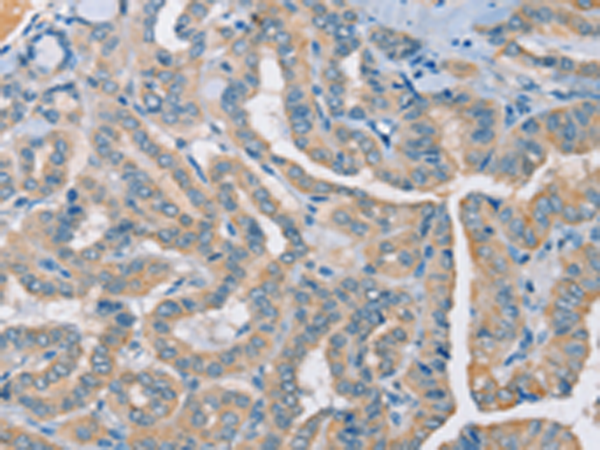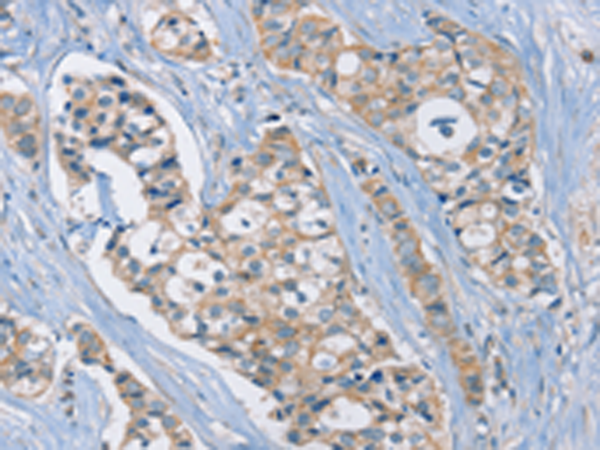


| WB | 咨询技术 | Human,Mouse,Rat |
| IF | 咨询技术 | Human,Mouse,Rat |
| IHC | 1/25-1/100 | Human,Mouse,Rat |
| ICC | 技术咨询 | Human,Mouse,Rat |
| FCM | 咨询技术 | Human,Mouse,Rat |
| Elisa | 1/2000-1/5000 | Human,Mouse,Rat |
| Aliases | RECA; BRCC5; MRMV2; HRAD51; RAD51A; HsRad51; HsT16930 |
| WB Predicted band size | 37 kDa |
| Host/Isotype | Rabbit IgG |
| Antibody Type | Primary antibody |
| Storage | Store at 4°C short term. Aliquot and store at -20°C long term. Avoid freeze/thaw cycles. |
| Species Reactivity | Human, Mouse |
| Immunogen | Synthetic peptide of human RAD51 |
| Formulation | Purified antibody in PBS with 0.05% sodium azide and 50% glycerol. |
+ +
以下是3篇关于RAD51抗体的代表性文献及其摘要:
1. **文献名称**: "Homologous recombination and human health: the roles of BRCA1. BRCA2. and RAD51"
**作者**: Prakash R, et al.
**摘要**: 该综述重点探讨RAD51在DNA同源重组修复中的核心作用,并强调针对RAD51的抗体在检测DNA损伤修复焦点(foci)中的应用,尤其在BRCA突变癌症模型研究中作为关键实验工具。
2. **文献名称**: "RAD51 foci as a biomarker for homologous recombination repair deficiency in cancer"
**作者**: Gogola E, et al.
**摘要**: 研究验证了使用抗RAD51抗体通过免疫荧光技术定量核内RAD51 foci,可作为评估肿瘤细胞同源重组修复缺陷(HRD)的临床诊断标志物,为PARP抑制剂治疗提供预测依据。
3. **文献名称**: "Comparative analysis of commercial RAD51 antibodies for recombination activity assessment"
**作者**: Sato K, et al.
**摘要**: 对比了多种商业来源的RAD51抗体(如Abcam#ab133534和Cell Signaling#D4B2)在Western blot、免疫组化中的特异性差异,提出标准化抗体选择对精准检测RAD51功能活性的必要性。
The RAD51 antibody is a crucial tool in studying the molecular mechanisms of DNA repair and genome stability. RAD51. a highly conserved protein, plays a central role in homologous recombination repair (HRR) by facilitating strand exchange between damaged DNA and intact homologous sequences. This process is vital for repairing double-strand breaks (DSBs), which, if unrepaired, can lead to genomic instability, carcinogenesis, or cell death. RAD51 forms nucleoprotein filaments on single-stranded DNA, enabling homology search and recombination. Its activity is tightly regulated and often dysregulated in cancers, particularly those with BRCA1/2 mutations (e.g., breast and ovarian cancers), making it a biomarker of "BRCAness" and a predictor of PARP inhibitor sensitivity.
RAD51 antibodies are widely used in research to detect RAD51 expression, localization, and foci formation (indicative of active HRR) through techniques like immunofluorescence, Western blotting, and immunohistochemistry. These antibodies help assess HRR proficiency in cancer cells, study synthetic lethality in BRCA-deficient tumors, and investigate chemoresistance mechanisms. Commercially available RAD51 antibodies are typically raised against conserved epitopes, often validated for cross-reactivity in human, mouse, and rat models. Quality validation includes testing in knockout cell lines to confirm specificity. Recent applications also extend to developmental biology and understanding replication stress responses. Proper antibody selection depends on the experimental model and detection method, emphasizing the need for rigorous validation to ensure accurate interpretation of RAD51's dynamic roles in genome maintenance.
×